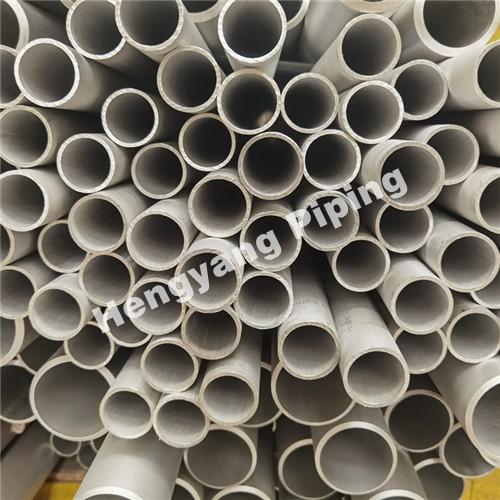What is Alloy Steel Pipe Used For? A Comprehensive Guide
Introduction:
Alloy steel pipes are an essential component in various industries, offering exceptional strength, durability, and corrosion resistance. This comprehensive guide will delve into the applications and benefits of alloy steel pipes, shedding light on their significance in modern engineering and construction. Whether you're a professional in the field or simply curious about the uses of alloy steel pipes, this article will provide valuable insights into their purpose and advantages.
1. Understanding Alloy Steel Pipes
Alloy steel pipes are made from a combination of carbon steel and various alloying elements such as chromium, molybdenum, nickel, or vanadium. The addition of these elements enhances the mechanical properties of the steel, making it more resistant to high temperatures, pressure, and corrosion. Alloy steel pipes are available in different grades, each with specific properties suitable for particular applications.
2. Industrial Applications
Alloy steel pipes find extensive use in a wide range of industrial applications. Their exceptional strength and resistance to wear and tear make them ideal for demanding environments. Let's explore some key industries where alloy steel pipes are commonly employed.
3. Oil and Gas Industry
The oil and gas industry relies heavily on alloy steel pipes for exploration, drilling, and transportation purposes. These pipes are used in offshore platforms, refineries, and pipelines, where they withstand extreme pressures and corrosive environments. Their ability to resist corrosion and high temperatures ensures the safe and efficient transfer of oil and gas.
4. Power Generation
In the power generation sector, alloy steel pipes play a vital role. They are used in power plants, including thermal, nuclear, and renewable energy facilities. Alloy steel pipes are used for carrying steam, water, and other fluids at high temperatures and pressures. Their durability and resistance to heat and pressure fluctuations make them indispensable in this industry.

5. Construction and Infrastructure
Alloy steel tubes are extensively utilized in construction and infrastructure projects. They are employed for structural purposes, such as the construction of bridges, buildings, and stadiums. The high tensile strength and load-bearing capacity of alloy steel pipes make them suitable for handling heavy loads and ensuring structural integrity.
6. Automotive Industry
In the automotive industry, alloy steel pipes find applications in exhaust systems, engine components, and chassis construction. These pipes exhibit excellent heat resistance and contribute to improved fuel efficiency and performance. Additionally, alloy steel pipes are utilized in the production of shock absorbers and suspension systems due to their exceptional strength and durability.
7. Aerospace and Defense
Related links:Everything You Need to Know About Molybdenum Wire Mesh
Why Are Security Screens Essential for Businesses Now?
Lithium-Ion Battery Anode Material: What's the Best Choice for Long-lasting Power?
Streamline Your Operations with Cold Rolled Coil Packaging
Revolutionizing Wealth Accumulation: The Rise of Cryptocurrency" Do you think cryptocurrency is the future?
The Ultimate Guide to Making Graphite Electrodes: From Raw Materials to Finished Product
Is tungsten carbide shield cutter worth the price?
The aerospace and defense sectors demand materials that can withstand extreme conditions while ensuring safety and reliability. Alloy steel pipes are extensively used in aircraft manufacturing, rocket engines, and defense equipment. Their ability to withstand high temperatures, pressure differentials, and corrosive environments make them crucial for these industries.
8. Mechanical Engineering
Alloy steel pipes play a significant role in mechanical engineering applications. They are employed in the manufacturing of machinery, equipment, and tools. Alloy steel pipes provide strength and resistance to heavy loads, making them suitable for various mechanical components, including shafts, gears, and hydraulic systems.
9. Benefits of Alloy Steel Pipes
Alloy steel pipes offer several advantages that make them a preferred choice in various industries:
Exceptional strength and durability
Resistance to high temperatures and pressure
Corrosion resistance
Enhanced mechanical properties
Versatility in different applications
Longevity and low maintenance requirements
10. Conclusion
In conclusion, Hengyang alloy steel pipes are versatile, high-performance materials that find applications in a wide range of industries. From the oil and gas sector to construction, automotive, and aerospace industries, alloy steel pipes provide the necessary strength, durability, and resistance to meet demanding requirements. The unique properties of alloy steel pipes make them indispensable for applications where reliability and performance are paramount. By understanding the applications and benefits of alloy steel pipes, industries can make informed decisions and leverage these exceptional materials for their specific needs.
Remember, whether you're in the oil and gas industry or involved in construction and infrastructure, alloy steel pipes are the go-to choice for robust and reliable performance.
Is stainless steel the best choice for saltwater applications?
Perforated copper sheets: How to choose the best one for your business?
Is 12 inch ductile iron pipe a cost-effective investment for businesses looking to upgrade their infrastructure in the purchase stage of the B2B marketing funnel?
What are the top benefits of high-quality gabion mattress products in the purchase stage?
What are the requirements for stainless steel welding?
Sponge Titanium: Is it the future of sustainable fashion or just a passing trend?
How much does silicon carbide cost?











